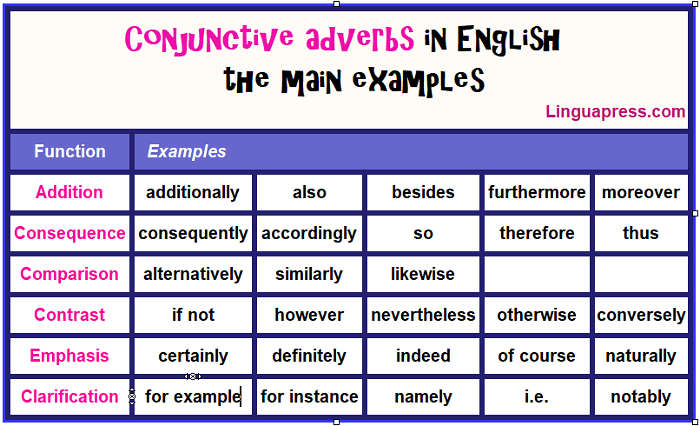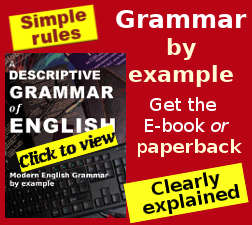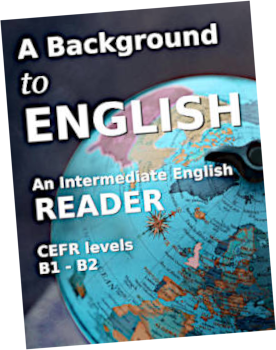Linguapress English Grammar
However, therefore and conjunctive adverbs
Coordinating
and subordinating words 2 :
Conjunctive adverbs such as
however or therefore
►
For other types of connectors, see conjunctions.Conjunctive adverbs : example however
Conjunctive adverbs are very similar to subordinating conjunctions. The biggest difference is that conjunctive adverbs can frequently (but not always) be used in a variety of positions within the subordinate clause, whereas subordinating conjunctions MUST stand at the start of the subordinate clause. Examples:
Conjunctive adverb : the position in the clause is flexible
Conjunctive adverb : the position in the clause is flexible
- They bought a new car; it was however still too small for their family.
- They bought a new car; it was still too small for their family, however
- They bought a new car; however
it was still too small for their family.
- They bought a new car; it was still too small however for their family.
- Although they bought a new car, it was still too small for their family.
Conjunctive adverbs can express different relations between two
clauses, including addition consequence, comparison, contrast, emphasis
or clarification. Here are some of the most common examples


The concise grammar
recommended by IATEFL
Voices,
EFL magazine
and other English teaching reviews
Ebook from just £3.99 / €4.49
Print & ebook from Amazon,
Print book from Barnes & Noble, Waterstones & other good bookshops
In
most cases, a
conjunctive adverb will come at the start of
the clause that it
introduces; however this is not essental, and with most conjunctive
adverbs other
positions are possible
Ebook from just £3.99 / €4.49
Print & ebook from Amazon,
Print book from Barnes & Noble, Waterstones & other good bookshops
Sentence structure and word order :
While they are both "connectors", It is important to distinguish between conjunctive adverbs and subordinating conjunctions, as they are not used in the same way. There are differences at two levels, as this table shows.| Secondary clause..... | With a conjunctive adverb | With a subordinating conjunction |
| Examples | Also,
however,
therefore, in fact, nevertheless, moreover, so (meaning therefore or and the same is true for) |
Although,
as,
because, before, until, while, since, so* (in the sense of purpose), so that |
| Sentence structure: Position of the secondary clause in the sentence | Fixed: It must follow the main clause | It can either precede or follow the main clause |
| Woprd order: Position of the connector (adverb or conjunction) within its clause. | Often but not always flexible | Fixed: It must come at the start of the secondary clause |
The special case of too
Too means the same as also, but is used after the clause to which it applies (examples 15 and 16 below). Too can also be used as an intensifier at the end of a secondary clause introduced by and .Different meanings of so
So, as a conjunctive adverb, can either express- a consequence (see example 5), as a synonym of therefore or hence, or
- an additional action (see example 6 ) , where it is a synonym of as.
For so with the meaning of purpose, see subordinating conjunctions.
For a general overview , see specific page on Uses of So .
More
Examples:
- I bought a new shirt; I also bought some new shoes
- I bought a new shirt; also I bought some new shoes.
- I bought a new shirt; I bought some blue suede shoes also
- This is good cheese; besides it's made locally.
- There's no more beer, so ( or therefore, hence, etc) we'll have to drink lemonade.
- I went to San Francisco last summer; so ( or as) did my brother.
- I didn't go to San Francisco, nor did my brother.
- They won the state lottery, therefore they are now rather rich.
- He found the solution; thus he was able to finish the project in time.
- He found the solution; he was thus able to finish the project in time.
- You can cross by ferry; alternatively you can take the Channel Tunnel.
- They bought a new house; it was however still too small for their family.
- They bought a new house; it was still too small for their family, however.
- Stop making that noise, otherwise I'll call the police.
- John went to London; Mary went there too
- I saw John and Mary too
Return to: ► Conjunctions or connectors
► List of terms - a glossary of grammar terms
Return to English Grammar index


 Copyright
information.
Copyright
information.